- Home
- Will McIntosh
Defenders Page 10
Defenders Read online
Page 10
As the defenders jumped, two at a time, from the aircraft, they didn’t appear to be almost three times as large as humans. The oversized aircraft and gear threw off Dominique’s perception. But as they dropped to the ground in an open field adjacent to a forest, they were almost half as tall as the trees, and the illusion was shattered.
Douglas grunted orders to his men, as the butterfly camera lifted off, giving Dominique a wider view of the terrain. A gentle slope led up to another wall of trees. The defenders fanned out, trotted across the field in what seemed like half a dozen steps, and disappeared into the forest.
It was strange, to think the Luyten didn’t know they were coming.
Dominique glanced at the feed originating with the sea-based B Company. The company was in skiffs, heading toward the beach. They looked awkward, riding six to a skiff in boats meant to carry twenty humans. They would attack from the west, while the airborne company attacked from the east.
The butterfly camera panned down to provide a glimpse of defenders moving through the forest below, then up, to provide their first look at the power plant. It was shaped like a figure eight lying flat. Four enormous storage tanks on stilts stood behind it, and all of this sat on a platform surrounded by a placid artificial lake of steel-blue seawater, pumped in from the nearby Pacific. The lake was bisected by three breezeways. A Luyten-modified heavy construction vehicle was crossing one of the breezeways, its Luyten operator clearly visible. Half a dozen other Luyten were moving around outside the plant.
The crackle of small-arms fire erupted in the forest below. The camera swung toward the trees.
By the time Dominique could see what was happening, it was over. Two Luyten lay dead, their centers jellied with ordnance wounds. Defenders confiscated the fallen Luyten weapons, and the company pushed on.
“There goes the element of surprise,” Willis said. “Though I doubt the defenders expected to make it right up to the gates without being spotted.”
Willis’s final words were partially drowned by an explosion coming over the feed, then two more on top of one another. The camera rose.
The Luyten had blown the three breezeways. Water surged to fill the gaps. The plant was now on an island.
“They’d better not set foot in that water. The Luyten will electrify it and fry them,” Colonel Willis said, stating the obvious. Dominique was certain the defenders would realize that immediately. They weren’t stupid grunts; their IQs were higher than the colonel’s.
When C Company reached the edge of the forest they hung back, out of range of the Luyten weapons. B Company—the one coming by sea—had landed on the beaches and was spread out, waiting for orders. Now the question was how to reach the Luyten.
Fifteen minutes crawled by as the defenders continued to hang back. Dominique wished whoever was controlling the camera would set it back down on Commander Douglas so they could hear the defenders’ planning, but it remained above the trees, providing a useless bird’s-eye view. Another camera was embedded with B Company, the third at HQ.
Three A-7 Razorback Harriers buzzed over the horizon from the north, from HQ and the Engineering Company. Dominique couldn’t easily see how three Harriers helped the situation, unless they used them to bomb the shit out of the Luyten position, which would mean destroying the power plant.
The first Harrier dropped low, close to the tree line. A defender sprinted out of the trees, leaped, and grabbed one of the Harrier’s skids, as if it were trying to pull the thing out of the air. The Harrier was more powerful than Dominique would have guessed; it rose rapidly, the defender clinging to it with one hand. Each of the other two Harriers took on a hitcher and rose as well. They rose steeply, headed toward the air above the fusion plant with blinding speed.
The Luyten, brandishing Y-shaped lightning rods, opened fire as they drew close. The defenders returned fire, pumping hot rounds from the handheld mortar launchers in their free hands. Dominique’s heart raced as she saw a Luyten go down. Then another, clipped on one limb and spun around.
From the beach side of the plant, defenders surged forward in twos, carrying the skiffs that had transported them to shore.
The first pair were hit by heaters, bursting into flame short of the artificial lake. Despite being thousands of miles away, Dominique felt singed by the heat that engulfed them, felt their loss like a sting as each managed a few steps before they fell, nothing but husks, black smoke rising from them.
Dominique took a deep breath, trying to calm herself. She hadn’t expected to feel their deaths so strongly, to take them so personally.
The next pair made it, as the airborne defenders continued to lay down a blinding cloak of cover fire, the Harriers diving toward the plant, then rising just as rapidly. The pair hurled the skiff into the lake and retreated. The lake was shallow; the skiff landed with a splash and lay impotently on its side.
The third pair heaved their skiff beyond the first, and suddenly Dominique understood what they were doing: They were building a bridge out of the skiffs, which were undoubtedly composed of carbon fiber, and not electricity-conducting.
Another aircraft flew into view to the east, this one large, clearly not a fighter. Without slowing it dropped a pile of unidentifiable materials—slabs and poles.
One of the Harriers was hit. It spun in a tight circle, dropping rapidly. The defender clinging to it let go, plummeted a hundred feet, and landed in a tucked roll on the edge of the platform surrounding the plant. It came up firing, its shots uncannily accurate.
Seconds later lightning crackled, the pale blue zigzag landing just beyond the stranded defender. It trembled violently and dropped.
“Shit,” Dominique said. Colonel Willis looked at her. She kept her eyes on the feed.
Ten or eleven defenders were down, maybe more. Each time one fell, Dominique felt it like a punch in the heart. Another skiff went into the water, this one hurled, flying end over end before landing. One more, and there was a ragged line in place, like stones across a brook.
Immediately, the defenders charged across it. The first few had no chance, but there was no hesitation in their steps as they leaped from skiff to skiff until they were hit, and fell.
C Company surged from the tree line. As they passed the materials dropped moments earlier, each scooped up rectangular sections and pilings.
As the battle raged to the west, the defenders to the east constructed a bridge, fitting pilings into slots in the large rectangles. They took Luyten lightning and heat fire, but it was tepid compared to what B Company had faced, because now the Luyten were under siege. Only one of the Harriers was still in the air, but it was wreaking havoc on the Luyten position. Maybe three dozen defenders had made it to the platform surrounding the plant.
Dominique watched as a defender, screaming with a rage that seemed all too personal, charged two Luyten blocking the entrance to the plant. He put a dozen bullets in one while slashing the other open with an uppercut of his edged forearm. Before reinforcements could reach him, he stepped to one side of the door, swung his arm around, and pumped artillery bursts at the door from his forearm unit. Before the smoke had cleared, one of his comrades charged what was left of the big door, dropping his shoulder and battering it open.
Fighting at close range, the defenders made vicious use of their size and the built-in blades running down their limbs. To say they were fierce fighters didn’t capture the jaw-dropping combination of rage and cold efficiency they displayed. Dominique found herself on her feet, roaring with her companions as the defenders tore the Luyten apart.
When the defenders dragged the last of the Luyten bodies from inside the plant, Dominique counted fifty-four. It would take a while, because the Andes to the east and the DeValparaiso range to the west would slow them, but more Luyten would come. They would come three at a time, from the nearest quadrants first, their numbers growing each day until they believed they had enough to retake the plant.
There had better be a lot of them.
&nbs
p; 18
Oliver Bowen
May 27, 2030. Washington, D.C.
Oliver couldn’t help thinking of Five. What was going through his mind, as he waited to follow the battles through the minds of his enemies? Was he nervous? Afraid?
“Mr. President?” Oteri gestured toward the wall of video feeds being transmitted from cities around the world. “The Luyten are attacking. Mumbai, London, Rio, Seoul.”
The president, who had been huddled in a corner, discussing something with his brother, hurried over.
In London, they were all over the streets, already past the defense perimeter. Oliver watched as a half dozen barreled through Trafalgar Square. It was raining, so their lightning bolts were electrocuting fleeing civilians in wide arcs around the points of impact. Bodies lay everywhere, the ruined soles of their feet smoldering. Crisscrossing blue blades sizzled along the puddled ground.
“How did they get through the perimeter defenses so quickly?” Wood shouted.
Nielsen was scanning data on his portable system, his fingers flying across the keys, seeking some answer.
“Look at Shanghai,” someone said.
They were in Shanghai as well, marauding through the darkness of the downtown area.
“They know the threat is real,” Ariel said. “They were waiting to see what the defenders could do. If the defenders had stumbled in Santiago, I bet they would have gone back to their slow-and-steady strategy.”
The population clock on the wall was racing backward. The human population was tens of millions fewer than it had been an hour before.
“They’re coming from underground,” Nielsen called out, still working his system.
“Underground?” Wood spun to face Nielsen. “How the fuck is that possible? All the subway lines were blasted precisely so they couldn’t come from underground.”
“They’re coming through the sewers.”
“The sewers? What do you mean, the sewers? They’re as big as fucking elephants.”
Elephants without bones. The voice in his head made Oliver flinch.
“Elephants without bones,” Oliver repeated aloud.
“What did you say?” Wood asked.
“I didn’t say it, Five did. Elephants without bones.” On the feed from New York, Oliver watched one of the big, rectangular sewer grates glow red and drop away. He pointed at the feed. “New York. Watch.” A Luyten squeezed out of the hole, its appendages folded tightly behind it until it popped free.
President Wood cursed a blue streak. He turned to Oteri. “Get the defenders out there.”
“They’ve already been released,” Oteri said. “Premier Chandar ordered it ten minutes ago.”
For once, Wood didn’t seem annoyed to be reminded he was not in charge. He seemed relieved.
It was difficult for Oliver to watch the carnage on the screens, but he couldn’t turn away; it was his duty to stay apprised of what was happening.
What was happening was, people were dying. The streets of London, New York, Rio, Shanghai were littered with corpses as the starfish killed everyone in sight on their march toward the production facilities.
“Order civilian evacuation of the areas surrounding all production facilities. Those people don’t know which way to run,” President Wood said.
The Luyten were choosing routes that sidestepped combatants, instead wreaking havoc on civilians, who had nowhere to hide. Some of the Luyten were being picked off by stationary visual-recognition drones set up on rooftops, but each of the drones only worked once, then the Luyten knew where they were and took them out.
Their heaters were firing almost continuously, burning and melting people, vehicles, the sides of buildings, leaving behind a landscape that resembled a giant scar.
“Where are they?” Wood growled.
It was a rhetorical question. The defenders were now an independent army, allied with the human forces but formulating their own battle plans. From this moment on, the human forces would have no idea where the defenders would strike, what tactics and strategy they might use.
In Manhattan, the first Luyten reached the production facility’s inner defenses and tucked behind buildings to wait for reinforcements. The ten blocks surrounding each production facility were heavily fortified. Silver heat shields the size of buses lined the perimeter; the turrets of heavy VRA guns poked from reinforced window slits in many of the old brick and concrete buildings. Oliver knew this sort of battle would not be as one-sided. In tight urban quarters their soldiers would be better able to hit Luyten, who didn’t hold the element of surprise, and the automated weapons systems would take their toll. He was also aware that if they lost these battles, the war was lost as well.
19
Lila Easterlin
May 27, 2030. Atlanta, Georgia
Cheena held the clunky box with its fat antenna up to her ear and said, “Talk to me, Hoochie. Anything new happening?”
The reply came after an absurdly long delay. “All quiet on the eastern front,” a woman’s voice squawked, causing Lila to flinch.
“Music to my ears,” Cheena replied. “Death to fish.”
Hoochie responded with a “Death to fish” of her own. Evidently it was their sign-off.
They were perched on a catwalk far above the floor of a defunct factory. Huge tanks lined the floor and walls, some hourglass-shaped, others spherical, a few tubular.
A voice burst from the walkie-talkie, paging Cheena. Cheena retrieved it. “Walk, tell me what you’ve got.”
“I’ve got defenders,” Walk said. “Two platoons were released from the Cheshire Bridge production facility an hour ago. Reliable source.”
Cheena raised her fist in the air. She was eighteen. Her long legs and confident style made Lila feel twelve. “What do they look like? Tell me, tell me.”
“Huge,” Walk reported. “I mean, huge. And angry, like trembling with rage. It’s not a good day to be a fish.”
The three of them burst into cheers. Lila hugged Alfe fiercely, then Cheena. Finally, something to give them hope. More than hope, if the reports from Chile were true.
Cheena set the walkie-talkie down on its end. “I’d say this calls for a celebration.” She stuck a finger in her jacket pocket, fished around until she came out with a little white ball of Lace. Setting it on the catwalk, she squeezed it until it popped, shooting a cloud of particles into the air. She and Alfe craned their necks, inhaled deeply. Lila followed suit.
Lace was a memory enhancer. You were supposed to think back to a time in your life and the drug would draw out those memories, making them super-vivid. It was also supposed to make you feel light enough to reach the clouds. Maybe Lila wasn’t inhaling enough of it. She took another big breath, thought back to when she was ten. If she was going to relive a time in her life, she wanted to relive ten.
At first it only felt like she was reminiscing about the good times, which she often did.
At Tybee Island Beach with her friend Margot and their dads. Eating oysters. Her dad singing oldies after he’d had a few beers. She and Margot making faces, singing modern hits to drown him out, only to have him sing louder.
Lila, stealing Dad’s access code and reprogramming his phone to take on the voice of a porn actress from an interactive she found in his cloud. Then Dad, after toning down the language, leaving the voice intact for a week, so Lila had to endure lurid, “Ooh, you like that, don’t you?” comments from his phone.
The memories grew warmer, more vivid, washing over her in waves.
Loblolly School. Seeing it again filled her with a glowing warmth, a profound comfort. She and Margot created Loblolly using a virtual-world-building kit, filled with characters their own age. It took them all summer, but it was worth it. Every day after school they’d meet in Loblolly and hang out with kids far more interesting than their actual classmates.
“Lila?”
The voice was far away. Lila probably wouldn’t have noticed if the voice hadn’t called her name, if it hadn’t been s
o familiar, and so frantic.
“Lila.”
She tried to open her eyes, but she just couldn’t leave the place where she was. It was so perfectly where she wanted to be.
“Lila. Jesus Christ almighty, what the fuck are you doing?”
She was eating a big, gooey block of frozen strawberry taffy at her tenth birthday party. Annabelle Toynbee was laughing and poking her in the ribs.
She gasped, jolted back into the present by something. She wasn’t sure what. The side of her face felt warm, almost hot. Her father was leaning over her, his shirt soaked with sweat in the V of the neck, and where his belly bulged against it. His eyes were wild.
He raised his palm, smacked her hard across the face.
Lila shrieked in surprise and rage, jerked herself up, her head still light, wanting to go back to the party.
“Wake up,” Dad said. “Alfe, Cheena, you too. Jesus, what did you take?”
Dad smacked her again. Screeching, Lila swung, trying to hit him back, but missed. He grabbed her hand, yanked it.
“I’m awake. Stop hitting me.” She took a huffing breath, trying to clear her head. He’d never hit her before, not on her worst day.
“Do you understand the situation we’re in?” Dad asked. “I mean, do you fully grasp what’s happening? Because you act like you don’t.”
Cheena sat up, looked groggily from Lila to her father. Alfe was blinking heavy eyelids, clearly still out of it.
“Yes, Dad, I fully grasp the situation,” Lila said. “We’re going to die. That’s the situation. I’m not sure what good it does me, but I grasp the situation.”
Dad stood, wiped his forehead with the back of his sleeve. “Come on, get up.” Then in a louder voice, “They’re coming, for God’s sake.”
She, Cheena, and Alfe struggled to their feet. Lila was fully in the present, her pulse racing, hallucinogenically vivid visions of Luyten crawling in the back of her mind.
“They’re coming now?” Cheena asked. “We just checked in at all the outlying areas with the walkie-talkie.”

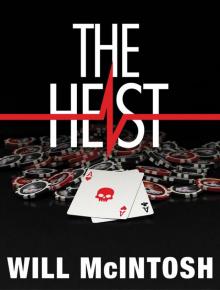 The Heist
The Heist Faller
Faller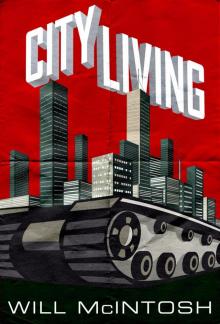 City Living
City Living The Perimeter
The Perimeter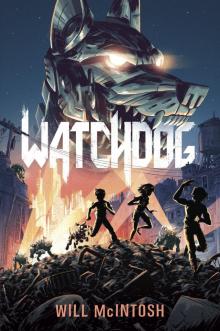 Watchdog
Watchdog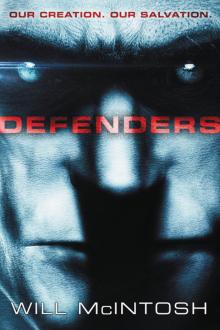 Defenders
Defenders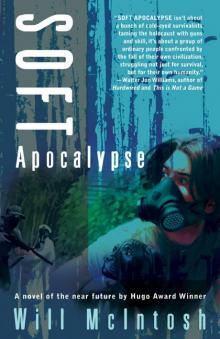 Soft Apocalypse
Soft Apocalypse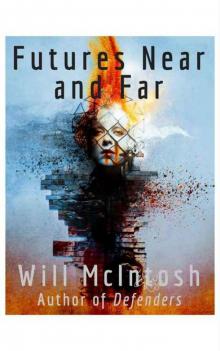 Futures Near and Far
Futures Near and Far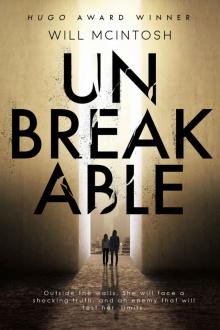 Unbreakable
Unbreakable The Future Will Be BS Free
The Future Will Be BS Free Hitchers
Hitchers Burning Midnight
Burning Midnight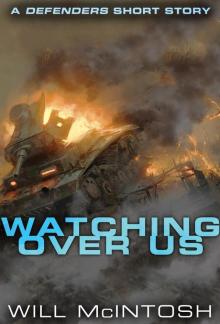 Watching Over Us
Watching Over Us